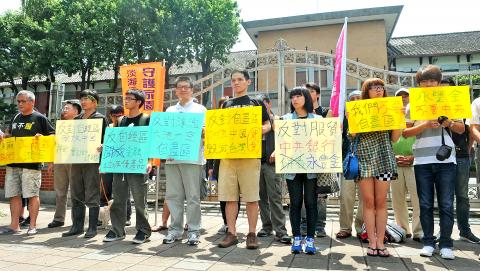Several academics, farmers and civic groups yesterday said that the government’s plan to allow agricultural products to be imported from China to free economic pilot zones for food processing would seriously harm the nation’s agriculture and farmers.
With the draft special act governing the proposed free economic pilot zones to be reviewed during the ongoing extra legislative session, academics, farmers and civic group members protested in front of the Legislative Yuan in Taipei, criticizing the draft act for allowing “value-added agriculture” to take place in the zones.
The Taiwan Rural Front said five articles in the draft act would seriously damage the nation’s agricultural output value and sustainability, ruin the credibility of “made in Taiwan” (MIT) products, as well as endanger consumers’ food safety if they are passed.

Photo: Wang Min-wei, Taipei Times
The nation’s food self-sufficiency rate stands at about 30 percent, which is relatively low compared with other nations, the group said, adding that self-sufficiency rates of about 70 percent in the UK, nearly 90 percent in Germany and about 42 percent in Japan, show that these free-trade nations still view domestic agriculture and food safety as important issues.
National Chung Hsing University economist Chen Chi-chung (陳吉仲) said the articles about value-added agriculture would allow banned agricultural products to be imported from China and processed in the zones and sold as MIT products.
Although Council of Agriculture Minister Chen Bao-ji (陳保基) has said 830 agricultural products from China are still prohibited, they would be allowed to enter the pilot zones and be processed as products for export under the the current pilot zone plan, Chen Chi-chung said, adding that other products made with Chinese agricultural ingredients can still be sold in the domestic market.
“If agricultural products are allowed to be imported under zero-tariff, then what food-processing company would still choose to use domestic food ingredients?” Chen Chi-chung asked.
Jang Show-ling (鄭秀玲), professor and chair of National Taiwan University’s Department of Economics, said if the products made of imported ingredients can bear the MIT brand for marketing, it may ruin the credibility of MIT products and endanger food safety, which may even be harmful to the nation’s food-processing industry in the long run.
National Taiwan University Department of Agricultural Economics chairman Roger Woo (吳榮杰) said the contents of the draft act are “cruel” to farmers and only beneficial to a small number of people.
Wu Chia-ling (吳佳玲), a rice farmer from Yilan County, said allowing food products made with Chinese agricultural ingredients to be sold under the MIT brand would force Taiwanese farmers to endorse agricultural products from China.
Hung Hsiang (洪箱), a watermelon farmer from Miaoli County, said Taiwanese farmers can process their grow and process their own food products, but the government is incapable of protecting domestic agriculture, so farmers want Chen Bao-ji to step down as minister.
They also urged the government to exclude articles related to “value-added agriculture” from the draft special act governing the proposed free economic pilot zones.

EVA Airways today confirmed the death of a flight attendant on Saturday upon their return to Taiwan and said an internal investigation has been launched, as criticism mounted over a social media post accusing the airline of failing to offer sufficient employee protections. According to the post, the flight attendant complained of feeling sick on board a flight, but was unable to take sick leave or access medical care. The crew member allegedly did not receive assistance from the chief purser, who failed to heed their requests for medical attention or call an ambulance once the flight landed, the post said. As sick

A drunk woman was sexually assaulted inside a crowded concourse of Taipei Railway Station on Thursday last week before a foreign tourist notified police, leading to calls for better education on bystander intervention and review of security infrastructure. The man, surnamed Chiu (邱), was taken into custody on charges of sexual assault, taking advantage of the woman’s condition and public indecency. Police discovered that Chiu was a fugitive with prior convictions for vehicle theft. He has been taken into custody and is to complete his unserved six-month sentence, police said. On Thursday last week, Chiu was seen wearing a white

EVA Airways, one of the leading international carriers in Taiwan, yesterday said that it was investigating reports that a cabin crew manager had ignored the condition of a sick flight attendant, who died on Saturday. The airline made the statement in response to a post circulating on social media that said that the flight attendant on an outbound flight was feeling sick and notified the cabin crew manager. Although the flight attendant grew increasingly ill on the return flight, the manager did not contact Medlink — a system that connects the aircraft to doctors on the ground for treatment advice during medical

The Taichung District Court yesterday confirmed its final ruling that the marriage between teenage heir Lai (賴) and a man surnamed Hsia (夏) was legally invalid, preventing Hsia from inheriting Lai’s NT$500 million (US$16.37 million) estate. The court confirmed that Hsia chose not to appeal the civil judgement after the court handed down its ruling in June, making the decision final. In the June ruling, the court said that Lai, 18, and Hsia, 26, showed “no mutual admiration before the marriage” and that their interactions were “distant and unfamiliar.” The judge concluded that the couple lacked the “true intention of